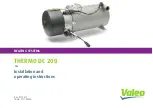
Page 10
Milltronics Weight Lifter MWL – Instruction Manual
7ML19981CR01
5. Test the unloaded MWL / Align crank bodies
• Remove the locking ball-pins from each of the crank bodies. The ball-pin on the
access side will serve as a locking safety pin when the weights are stored.
• Turn the crank handle and watch the lifting pads move up and down.
• Check to see whether any binding occurs during the process. If there is any
binding or hesitation, the crank bodies need to be aligned to each other.
Align the crank bodies to each other, if necessary
a. Loosen the two bolts that mount each crank body.
b. Turn the crank handle until the lifting pads have completed at least one
complete cycle from a raised to a lowered position: this process should
automatically align the crank bodies.
c. Retighten the bolts that mount the two crank bodies.
d. Check again, and repeat the process until the MWL operates smoothly, with no
resistance.
Calibration weight support (2)
Lifting-pads raised
Lifting-pads lowered
MWL48all.fm Page 10 Tuesday, June 12, 2001 8:23 AM













































